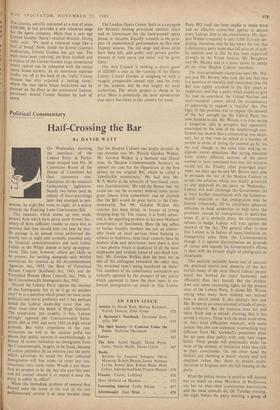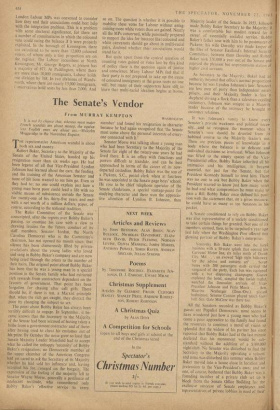Political Commentary
Half-Crossing the Bar
By DAVID WATT ON Wednesday morning the members of the Labour Party in Parlia- ment trooped into No. 10 Committee Room of the House of Commons for their customary con- fabulation on the session's
This measure, which comes up next week, renews Acts which have given some former Sec- retary of State sufficient trouble to cause him to promise that they should only run year by year. Its passage is an annual ritual performed dis- creetly late at night and normally attended only by fanatical constitutionalists and such lobby- fodder as the Whips depute to keep up appear- ances. This year, however, others are likely to be present, for nestling alongside such worthy candidates for renewal as the Accommodation Agencies Act, 1953, the Rent of Furnished Houses Control (Scotland) Act, 1943, and the Furnished Houses (Rent Control) Act, 1946, is the Commonwealth Immigrants Act, 1962.
Should the Labour Party oppose the'renewal of the Immigrants Act or let it go on another year? It is a question which poses the most acute political and moral problems and it has perhaps tested ,the Labour leadership more than any other issue since the death of Hugh Gaitskell. The temptation, put crudely, is this. Labour strongly opposed the Commonwealth Immi- grants Bill in 1961 and early 1962 on high moral grounds. But bitter experience in the con- stituencies (as well as the opinion polls) has shown that public opinion i§ overwhelmingly in favour of severe limitation on immigrants from the Commonwealth, largely, to be frank, because of colour prejudice. In an election year the party Which advertises its stand for freer coloured Immigration will lose votes—in some key con- stituencies very many votes. Would it not there- fore be prudent to let the Act slip past this year and (of course) amend it or repeal it once the party is safely in office?
When this immediate problem of renewal first floated onto the scene at the end of the last parliamentary session it at once became clear
that the Shadow Cabinet was deeply divided. At one extreme was Mr. Patrick Gordon Walker. Mr. Gordon Walker is a humane and liberal man. As Shadow Commonwealth Secretary he opened the case for the Opposition in the first debate on the original Bill, which he called a 'ramshackle monstrosity.' He laid into Mr. R. A. Butler as the advocate of 'bare-faced, open, race discrimination.' He told the House that 'we could not run the economy without some immi- grant labour from somewhere' and he claimed that the sill would do great harm to the Com- monwealth. Yet Mr. Gordon Walker this autumn has been firmly in favour of letting sleeping dogs lie. The reason, it is freely admit- ted, is the appalling problem in his own Midland constituency of Smethwick. Here the big influx of Indian foundry workers has put an unbear- able strain on local services from housing to schools to midwives; here local councils have let matters slide and deteriorate; here there is now a race phobia which is displayed in all the most unpleasant and virulent forms of anti-black fan- tasy. Mr. Gordon Walker does his best, but as one of his colleagues remarked the other day, 'the wretched man's being murdered up there.' The members of his constituency association are violently agitated by the prospect of any policy which appeared to leave the door open to un- limited immigration—so much so that Labour Party HQ itself has been unable to shake them: and an effective colour-bar applies in almost every Labour club in the constituency. Mr. Gor- don Walker's majority is only 3,500. It is not sur- prising, therefore, that he has taken the line that a democratic party must take full account of pub- lic opinion and in this he has been supported strongly by Sir Frank Soskice, Mr. Houghton and Mr. Healey and to a lesser extent by nearly all the other Shadow Cabinet members.
The most prominent exceptions were Mr. Wil- son and Mr. Brown, who took the line that this is a question of morality and conscience; that the Bill was rightly attacked in the first place as iniquitous; and that a party which claims to give the lead on apartheid, the United Nations and multi-racialism cannot afford the inconsistency ' cf appearing to support a 'racialist' Act. The logic of this position was to oppose the renewal of the Act outright (as the Liberal Party has now decided to do). Mr. Wilson, it is true, seeing a dangerous split in prospect, had apparently concluded by the time of the Scarborough con- ference last month that a compromise was neces- sary, for at that time he talked to a number of people in terms of letting the renewal go by 'on the nod' though at the same time making in- dignant moral objections. But strong reactions from widely different sections of the party seemed to have convinced him that this solution would not do. Finally, after prolonged argu- ment, ten days ago he and Mr. Brown were able to persuade the rest of the Shadow Cabinet to accept the solution which was finally presented to and approved by the party on Wednesday. Labour will now challenge the Government (a) to have further consultation with the Common- wealth countries so that .immigration may be . limited voluntarily, (b) to contribute adequate subsidies to local authorities to help solve the problems caused by .immigration in particular areas. If, as is perfectly plain, the Government refuses to budge, Labour will vote against the renewal of the Act. The general effect is thus that Labour is in favour of some limitation on immigration even from the Commonwealth though it is against discrimination on grounds of colour and regards the Government's efforts to deal with the present plight of immigrants as inadequate.
This analysis naturally leaves out of account the practical merits and demerits of the Act (which many of the most liberal Labour people admit has worked far more humanely and efficiently than they feared). But the incident does cast some interesting lights on the present state of the Labour Party. It shows Mr. Wilson taking what many have claimed was beyond him—a moral stand. It also displays him and Mr. Brown in an unaccustomed attitude of amity and solidarity. But the business does not end there. Each side is already claiming that it has scored a victory. Those with the most acute sense of their local difficulties maintain, with some justice, that this new statement is something very different from Mr. Gaitskell's passionate pleas for an open door policy with only very vague limits. These people will presumably make the most of 'the element of limitation when they talk to their constituents. On the other hand the liberals are claiming .a major victory and will continue (when they dare) to preach multi- racialism in England with the full blessing of the party, .
What the policy means in practice will depend not so much on .what Members of Parliament say but on what-their constituency associations and the local councils do. On Tuesday evening, ,the night before the party meeting, a group of London Labour MPs was convened to consider how they and their associations could best help with the integration problem. This is a problem with some electoral significance, for there are a number of constituencies in which the coloured vote could swing the balance if it were properly exploited. In the borough of Kensington, there are calculated to be more than 12,000 coloured voters. of whom only a tiny proportion are on the register. The Labour incumbent at North Kensington, Mr. George Rogers, at present has a majority of 877. At Paddington, where there are more than 10,000 immigrants, Labour holds one division by 768. In two divisions of Wands- worth, where there are nearly 15,000 immigrants, Conservatives hold seats by less than 2,000. And so on. The question is whether it is possible to mobilise these votes for Labour without antag- onising more white voters than are gained. Nearly all the MPs concerned, while personally prepared to support the idea for instance that coloured and white canvassers should go about in multi-racial pairs, doubted whether their associations would stand for it.
But quite apart from the cynical question of counting votes gained or votes lost by this kind of policy there is the question again of justice and conscience. Many Labour MPs feel that if their party is not prepared to take up the cause of coloured immigrants at the grass roots no one will, but many of their supporters have still to learn that multi-racial idealism begins at home.



































 Previous page
Previous page